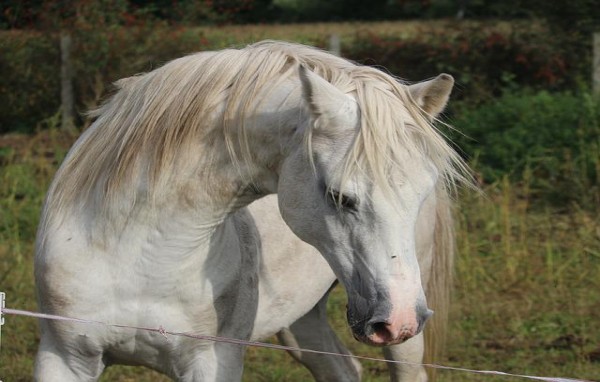Every horse owner is in love with their horse immensely. However, there comes a time when the four-legged loved one might face some sort of health issues and it may not just end their racing career but also hamper their overall health. Here we share some of the most common health problems in racing horses that should be noted as early as possible.
Also Check Out: 8 Major Cat Diseases: Symptoms, Prevention, and Treatment
Exercise-Induced Pulmonary Hemorrhage
EIPH is a very common health problem in racehorses and, depending on the severity, can result in increased veterinary costs as well as lost training and racing days for the owner. This syndrome, which affects nearly all horses during their racing careers, is distinguished by blood found in the horse’s airway following exercise that originates in the lungs.

Symptoms of Exercise-Induced Pulmonary Hemorrhage
Unless a horse has severe EIPH with blood in the nostrils (known as epistaxis), the main symptom is usually poor athletic performance; other signs are usually subtle and difficult to detect. EIPH may be indicated by frequent swallowing and coughing during the immediate post-exercise recovery period, as well as a lack of appetite following performance.
Exercise-Induced Pulmonary Hemorrhage Treatment in Horses
RBC counts in bronchoalveolar fluid from affected horses running on a treadmill are reduced by 33% when nasal dilator bands are applied. Alternative treatments, such as antihypertensive drugs, rheological agents (pentoxifylline), bronchodilators, prolonged rest, dietary supplements (hesperidin-citrus bioflavonoids), and anti-inflammatory drugs, have not demonstrated therapeutic benefit.
Colic
Colic, the leading cause of death in horses, refers to abdominal pain caused by a variety of factors. A simple obstruction, usually in the large colon, can cause discomfort; a strangulation, usually a twist or torsion in the small or large intestine that closes off the food passageway and blocks the blood supply; abnormalities of the intestinal blood supply (vasculature), usually caused by parasites (i.strongyle larvae in the blood vessels); and other disorders, such as gastric ulcers, can also cause discomfort.

Symptoms of Colic in RaceHorses
- They are frequently looking to the side.
- Biting or kicking their flanks or stomachs
- Lying down and/or rolling around.
- There is little or no manure passing.
- Fecal balls that are smaller than usual.
- Passing dry or mucus-covered (slime) manure.
- Poor eating habits, they may not consume all of their grain or hay.
- Changes in drinking habits.
- Heart rate greater than 45 to 50 beats per minute
- Gums that are tacky.
- Capillary refill time is lengthy.
- Mucous membranes that are discoloured
Colic Treatment in Horses
Horses suffering from colic are in pain; common equine pain relievers such as phenylbutazone are used to treat colic. Some colic horses have overactive spasming intestines. In such cases, medications that reduce intestinal motility can be used.
Upper Respiratory Tract Dysfunction
The racehorse relies on normal mechanical function of the upper airway. An endoscopic examination is used to make the primary diagnosis. Some of the conditions can be treated surgically, with the outcome depending on the individual case. The following are the most common issues:
- Displaced soft palate is common in young horses and is frequently associated with confirmation. Maturity, management, equipment changes, or surgical intervention may help.
- Laryngeal paralysis (roarer) is a mild to severe impairment of the ability to abduct an arytenoid, with a corresponding impact on performance as airway size decreases. In most cases, surgery is an option.
- Aryepiglotic epiglottis – the epiglottis becomes encased in aryepiglottic tissue (membranes that are normally under epiglottis). With surgery, this condition usually has a good prognosis.
- The entire pharynx shrinks in size during exercise, resulting in a collapsing pharynx. This can only be seen with dynamic videoendoscopy. It has a poor chance of racing success.

Upper Respiratory Tract Dysfunction Symptoms
If your horse has a runny nose, cough, fever, listlessness, or depressed behaviour, he most likely has an upper respiratory infection. Fall, winter, and spring are prime seasons for respiratory diseases, which are frequently caused by one or more of four common pathogens.
Treatment of Upper Respiratory Tract Dysfunction in Horses
Consulting with a veterinarian about which vaccinations are recommended and maintaining a regular vaccination schedule for all horses is the first step in protecting them from respiratory infections and other diseases. The age, use, and frequency of travel of a horse will be considered when determining which vaccinations are required.
Gastric Ulcers
Gastric ulcers in horses can occur at any age. Equine gastric ulcers affect up to 90% of racehorses and 60% of show horses, as well as non-performance horses and foals. Ulcers are caused by the erosion of the stomach lining as a result of prolonged exposure to stomach acid.

Symptoms of Gastric Ulcers in Racing Horses
Delayed gastric emptying, gastroesophageal reflux and esophagitis, megaesophagus, and acute perforation are all conditions that can occur. In foals, sudden gastric perforation without prior clinical signs occurs sporadically.
Adult horses with EGUS exhibit nonspecific or ambiguous clinical signs such as poor performance, abdominal discomfort (colic), poor appetite, mild weight loss, poor body condition, and behavioral changes.
Gastric Ulcer Treatment in Race Horses
- Supportive care and dietary control
- Omeprazole (treatment of choice, few reported adverse effects)
- Dietary management, such as feeding low-starch grains and alfalfa hay to buffer stomach contents, is part of supportive care.
Tying Up Syndrome
Exertional rhabdomyolysis, also known as “tying up,” is a muscle condition caused by exercise that causes a shortened, stiff stride, anxiety, and pain, and can sometimes result in the horse being unable to move forward. In severe cases, muscle damage can cause permanent muscle atrophy and, in rare cases, renal failure. Management and early diagnosis are critical in the treatment of this syndrome in racehorses.

Tying Up Syndrome Symptoms in Race Horses
- Slight, sometimes unnoticeable cramping, or the horse may be reluctant to move in more severe cases.
- Lower back, gluteal, and thigh muscles stiffen and become painful.
- The gait shortens and stiffens.
- Excessive sweating, rapid, shallow breathing, and an elevated heart rate are observed, all of which mimic colic symptoms.
Treatment of Tying Up Syndrome in Horses
When it is suspected that a horse is tying up, it is always best to consult with a veterinarian. Some incidents necessitate immediate veterinary care, whereas mild RER cases can be handled by an experienced horse person. When an episode of exercise-induced tying-up occurs, the activity should be immediately halted and the horse evaluated. Treatment options can vary depending on the cause.
EPM (Equine protozoal myeloencephalitis)
Horses suffer from a common neurological disease. EPM horses typically have gait abnormalities, but they may also show signs of brain disease. The severity of the disease ranges from mild lameness to sudden recumbency, and clinical signs are usually progressive. Sarcocystis neurona and Neospora hughesi have been identified as the causative protozoa agents. Clinical signs and antibody tests on blood or spinal fluid are used to make the diagnosis. Treatments are aimed at inhibiting protozoa metabolism, and treatment-related improvements may be observed over time.

EPM Equine protozoal myeloencephalitis Symptoms
- Coordination problems; stiff, stilted movements lameness or abnormal gait
- Incoordination and frailty
- This is exacerbated when going up or down slopes, or when the head is up.
- Muscle wasting
- Most obvious along the topline or in the hindquarters
- Sometimes the face or front limb muscles are involved.
- Eyes, ears, or lips that droop
- Swallowing Difficulties
- Convulsions or collapse
- Sweating that is excessive
- Loss of sensation in the face, neck, or body
- Poor balance and head tilt
- For support, stand splay-footed or lean against the stall walls.
Treatment of EPM – Equine protozoal myeloencephalitis in Horses
For EPM, there are two treatment options.
A six-month course of trimethoprim-sulfonamide antibiotics and antiprotozoal agents (pyrimethamine).
A 28-day antiprotozoal course (ponazuril). In some cases, horses may require a second round of ponazuril. This is the only FDA-approved EPM treatment.
Your horse may require general supportive care depending on his or her condition.
Infectious disease
Infectious disease refers to any disease process that can spread quickly to others via aerosol or direct contact. Equine herpes virus, equine influenza, and other viruses are examples. Because of the frequent introduction of new horses, confined stabling areas, and travel between racing venues, race training facilities are at risk of infectious disease. Most racetracks have specific vaccine requirements, and care is taken to manage the entire backside as well as the individuals to reduce this risk.

Symptoms
Symptoms include fatigue, loss of appetite, fever, anaemia, weight loss, jaundice, and edema.
Treatment
There is no treatment for secondary bacterial infections other than supportive care, anti-inflammatory medications, and antibiotics.
References and Sources:
Source 1, Source 2, Source 3, Source 4
For all types of animal and animal care – Explore our exclusive section – Animal Healthcare





